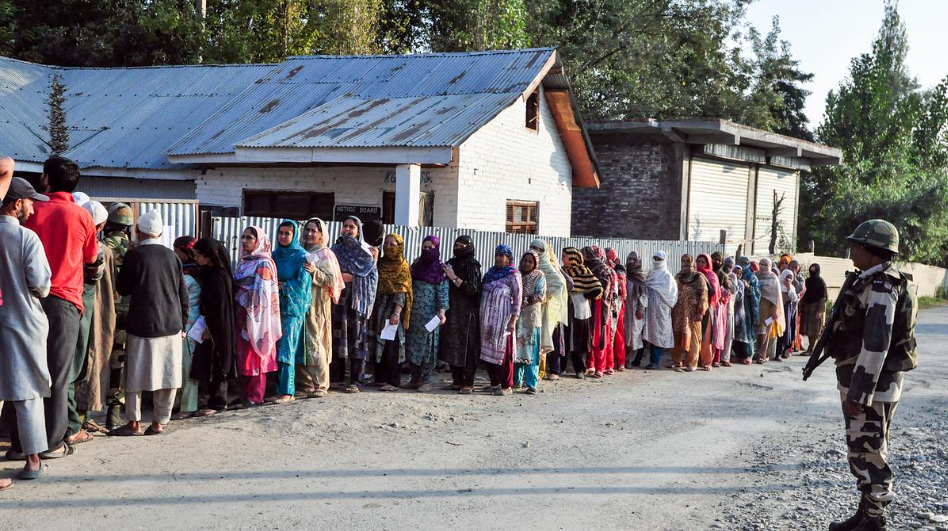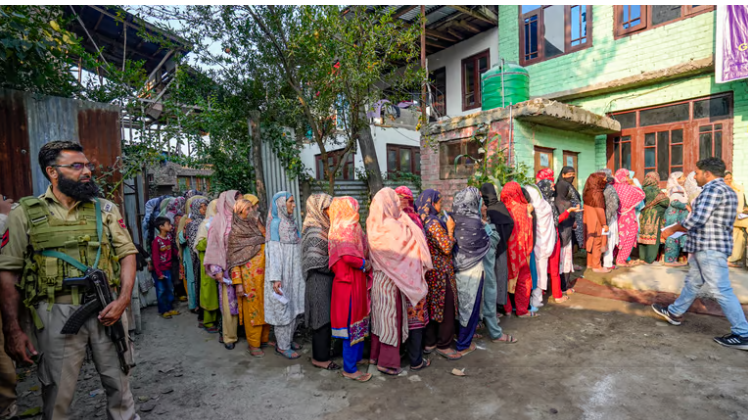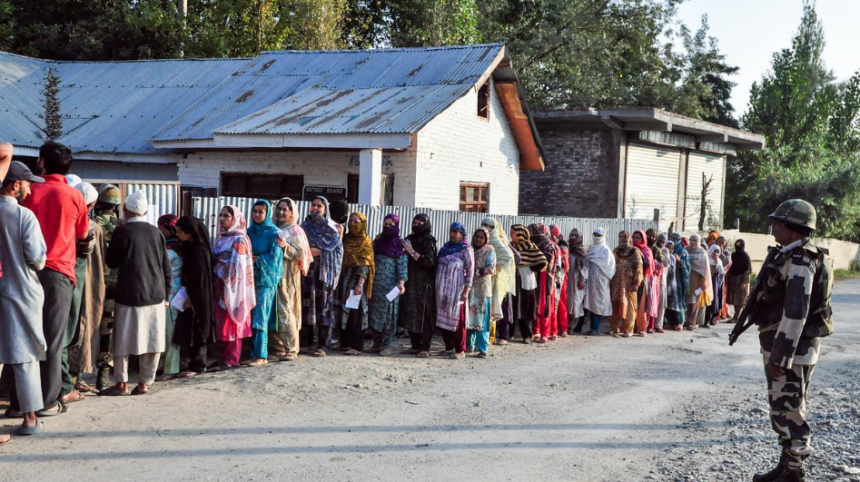Peaceful Phase 2 Polling in J&K witnessed a peaceful turnout of 57%, marking a significant event in the ongoing elections. The districts of Reasi and Poonch saw notably high voter participation, while even Srinagar, a city that often records lower turnout due to political instability, exceeded expectations. The Chief Electoral Officer (CEO) expressed satisfaction over the smooth conduct of the elections, mentioning that no booth reported any incident that would warrant a repoll. With the situation under control, the focus remained on the participation of people from remote areas, including those close to the Line of Control (LoC), which has seen a rise in militant activities.
High Turnout in Reasi and Poonch
Reasi district emerged as the leader in voter turnout with a remarkable 74.7% participation, reflecting the trust and enthusiasm of the local population in the electoral process. Poonch followed closely with 73.8%, signaling a widespread determination to contribute to the political process despite the proximity to the LoC and a history of cross-border tensions.
The high turnout in these districts can be attributed to multiple factors. Historically, these areas have shown resilience, and the participation of people reflects their desire for development and political representation. The local administration’s efforts to ensure a smooth and secure election process further instilled confidence among voters.
Both Reasi and Poonch are hilly regions with several difficult-to-reach villages. Despite these challenges, people from all walks of life made their way to polling stations, some walking for hours or traveling on makeshift roads. The administration’s deployment of security forces ensured that the election process went undisturbed, providing a secure environment for voters to exercise their democratic rights.
Srinagar Shows Significant Improvement in Polling Percentage
The turnout in Srinagar, the summer capital of J&K, witnessed a noticeable increase in participation. While Srinagar has often been marred by lower turnout due to political skepticism and ongoing tensions in the region, this time around, it surpassed its Lok Sabha figure by over 5%. This improvement signifies a change in the political climate of the city and could be seen as a sign of the gradual return of public faith in the electoral process.  For the more information click on this link
For the more information click on this link
The rise in voter participation in Srinagar was a result of a multifaceted approach by the election commission and local administration, involving heavy security arrangements and outreach programs to encourage people to vote. Additionally, the urban population, particularly the youth, appeared more engaged in this election cycle compared to previous ones, a potential signal of evolving political awareness and aspirations for stability.
No Reports of Violence or Booth Issues
The Chief Electoral Officer (CEO) expressed satisfaction regarding the peaceful conduct of the elections. According to the CEO, there were no reports of violence or any incidents that would require a repoll. This was a significant achievement given the region’s history of electoral disruptions, including stone-pelting incidents, threats from insurgent groups, and sporadic violence during election seasons in the past.
The security forces, working in coordination with local law enforcement, ensured that polling stations were well-protected, particularly in sensitive areas. The election authorities had identified several “vulnerable” polling booths prior to the election day and had deployed additional personnel to these areas, ensuring voters were free from intimidation or harm.
Rajouri and Poonch: Voting Amid Tensions Near the LoC
One of the most remarkable aspects of the election was the voter turnout in areas near the LoC, especially in Rajouri and Poonch. These districts have seen an increase in militant attacks in recent months, with cross-border infiltration and skirmishes adding to the challenges faced by residents. Despite this, the sight of long queues at polling stations was a testament to the people’s commitment to exercising their right to vote, even in the face of adversity.
Security was of paramount importance in these border districts. The local administration, along with military personnel, worked tirelessly to secure polling stations and provide safety to voters. This effort included area domination exercises by the Indian Army, surveillance drones, and intensified patrolling along the border. Such measures not only ensured a peaceful election process but also reassured voters, encouraging them to come out in large numbers.
Voter Sentiments: Aspirations for Peace and Development
Interviews with voters across the region revealed a mixture of emotions—ranging from hope to frustration, but largely centered on the desire for peace and development. In Reasi and Poonch, the primary concerns of voters were the need for infrastructure development, better roads, Peaceful Phase 2 Polling in J&K healthcare facilities, and employment opportunities.
In Srinagar, conversations with the urban electorate indicated a strong desire for political stability and progress. The younger generation, in particular, Peaceful Phase 2 Polling in J&K voiced their demand for improved educational opportunities, employment avenues, and more substantial government initiatives in sectors such as technology and tourism.
In the border districts, however, the conversation was starkly different. Here, peace and security took precedence over development. Residents of areas near the LoC expressed their concerns about the constant threat of shelling and militant attacks, which have impacted their livelihoods and quality of life. Despite this, Peaceful Phase 2 Polling in J&Kthey showed a resilient determination to vote, indicating their belief in democracy as a tool for change.
Security Measures: Ensuring a Peaceful Process
The security apparatus for Phase 2 of the J&K elections was comprehensive, involving coordination between the Jammu and Kashmir Police, Peaceful Phase 2 Polling in J&K the Central Reserve Police Force (CRPF), and the Indian Army. Security personnel were deployed in large numbers, with some polling booths in sensitive areas receiving additional protection. The administration made arrangements for quick-response teams to be on standby in case of any incidents.
One of the key measures undertaken was the establishment of mobile teams in remote areas, ensuring that no voter was left behind due to logistical challenges. Helicopters were used to airlift election personnel to remote polling stations in Reasi and other mountainous regions.
Moreover, there were strict checks at polling booths to ensure the process remained free from any form of manipulation or violence. Voters were required to pass through multiple layers of security before casting their votes. Security forces also monitored the situation in real-time, Peaceful Phase 2 Polling in J&K keeping a close watch on any unusual activity through surveillance systems.  For the more information click on this link
For the more information click on this link
Challenges Faced During the Election Process
Despite the overall success of Phase 2 polling, there were still challenges. One of the primary issues was the logistical difficulty of reaching some of the more remote polling stations, Peaceful Phase 2 Polling in J&K especially in the hilly terrains of Reasi and Poonch. Election officials had to make significant efforts to ensure that polling stations were operational and accessible to voters.
Weather also played a role in certain areas, with unexpected rain in some parts causing minor delays in the voting process. However, these were quickly resolved by local officials and did not significantly impact voter turnout.
Another challenge was voter apathy in certain urban pockets, particularly in areas of Srinagar, where mistrust of the political system remains high. While the overall turnout in the city saw an improvement, Peaceful Phase 2 Polling in J&K there is still much work to be done in terms of restoring public faith in the political process.
Conclusion: A Step Toward Democratic Stability
The peaceful and largely successful completion of Phase 2 polling in Jammu and Kashmir is a positive indicator for the region’s democratic journey. The high voter turnout in districts like Reasi and Poonch is a testament to the enduring faith of the people in the electoral process. Even in Srinagar, Peaceful Phase 2 Polling in J&K where political disillusionment has been common in past elections, the increase in voter participation suggests a potential shift toward greater political engagement.
Security remains a critical issue, especially in border areas near the LoC, but the successful conduct of the elections underlines the effectiveness of the joint efforts by local authorities, security forces, and the election commission. As the election process moves forward, the hope is that this phase of peaceful and inclusive elections will lay the groundwork for long-term peace, stability, Peaceful Phase 2 Polling in J&K and development in Jammu and Kashmir.
The high turnout also sends a clear message: the people of Peaceful Phase 2 Polling in J&K, despite challenges, remain committed to shaping their future through democratic means. With the completion of the second phase, attention will now turn to the final phases of the election, with the hope that peace and participation will continue to prevail across the region. ALSO READ:- SBI Reports Credit Demand from Indian Corporates Surging to ₹4 Lakh Crore: Analyzing the Trends and Implications for the Economy 2024





